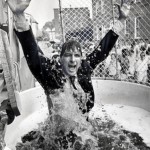How one local brewer used quality to change an industry
– – –
Samuel Adams stems from a Vienna lager recipe handed down from his father that Koch first brewed in his kitchen in 1984. Since then, the Harvard Business School graduate went from a Boston brewery so small that Koch’s Samuel Adams Boston Lager had to be brewed under contract in Pittsburgh, Portland, Cincinnati and elsewhere — with SABMiller handling some production.
Today, Koch’s Boston Beer Co. has a research-and-development facility, barrel room and tour center in Boston, and two large brewing facilities in Cincinnati (at the old Hudepohl-Schoenling brewer that once employed Koch’s dad) and Breinigsville, Pa. (in an old Stroh brewery). As a result, the company’s beer production has soared from 63,000 barrels in 1989 to nearly 2.9 million in 2013.
However, Boston Beer’s total production was 3.4 million barrels last year, thanks to a diverse group of offerings that were notably absent from Koch’s kitchen 30 years ago. In 2000, Boston Beer launched its Twisted Tea brand of flavored malt beverages that still bolsters the company’s $3 billion business to this day. After stumbling a bit with the Hard Core cider it released in 1995, Boston Beer scored a huge coup when it introduced its Angry Orchard cider line nationwide and became the top-selling cider producer in the country, according to market research firm IRI.
‘After 30 years, I’m very aware of how capable the big brewers are at competing in the marketplace.’Jim Koch, founder of Boston Beer Co.
Boston Beer is entering a future in which it not only has to fend off large brewers with its own products and acquisitions, but has to remain relevant to craft-beer drinkers who have a tendency to gravitate to the next great beer of the moment. It also has to adapt to a shifting craft-beer landscape in which consolidating distributors, expanding craft brewers and more than 3,000 total U.S. brewers present as many obstacles as opportunities.
Interview:

